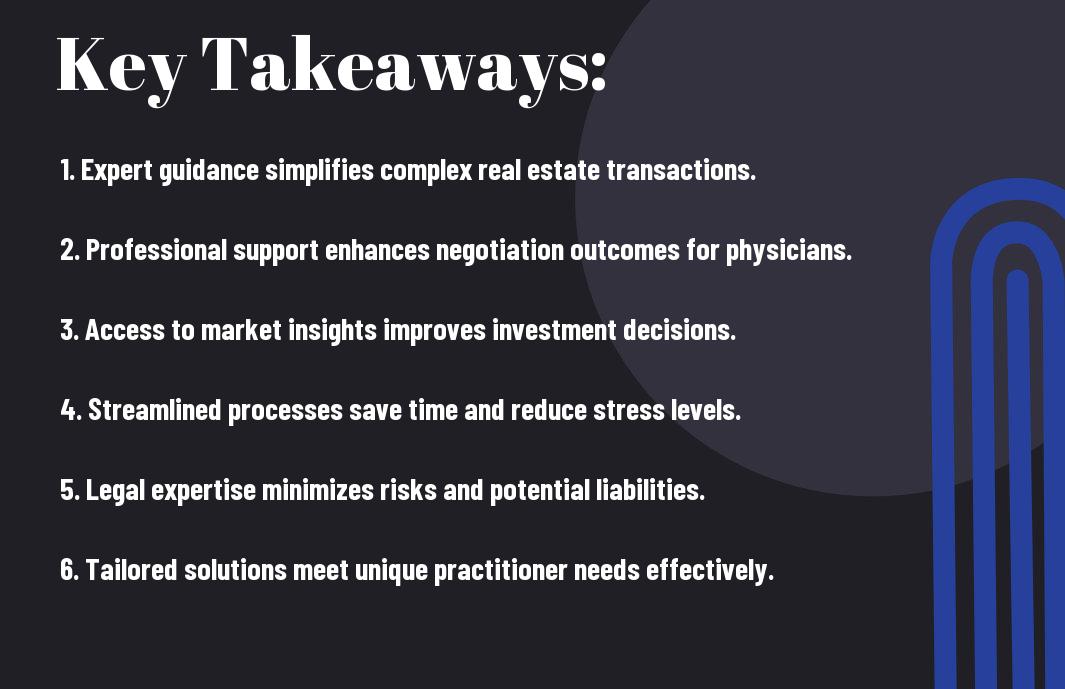With the complexities of real estate transactions, especially for physicians, having professional support is vital to ensuring your interests are protected and your investments yield optimal results. Navigating the market without expert guidance can lead to financial pitfalls and missed opportunities. In this blog post, you will learn how specialized real estate services can enhance your practice’s growth, streamline the purchasing process, and provide you with the tools needed to make informed decisions tailored to your unique circumstances.

Understanding Physician Real Estate Services
Your journey in finding the right real estate solutions as a physician is imperative for your practice’s success. Physician real estate services encompass a wide range of offerings tailored to meet the unique needs of medical professionals, from acquiring new office spaces to negotiating leases and sales of existing properties. By leveraging specialized knowledge in healthcare and real estate, these services aim to streamline your search and ensure you make informed decisions that align with your professional goals.
Overview of Real Estate Needs for Physicians
One key aspect of your professional success is understanding the specific real estate needs unique to physicians. From selecting the ideal location for patient accessibility to ensuring compliance with healthcare regulations, your requirements go beyond traditional commercial real estate. You may need specialized facilities that accommodate medical equipment and provide a comfortable environment for your patients, while also keeping future expansion options in mind.
Key Challenges Faced by Medical Practitioners
With the evolving nature of healthcare, medical practitioners face various challenges in navigating the real estate market. You constantly juggle patient care, administrative responsibilities, and the complexities of finding suitable facilities that meet regulatory requirements. The competitive nature of medical real estate further complicates the process, making it vital to stay informed about market trends and investment opportunities.
In addition to these complexities, navigating financial limitations can significantly impact your real estate decisions. The intricacies of loans, lease negotiations, and understanding market valuations can overwhelm clinicians who are primarily focused on their practice. Without professional guidance, you risk making misinformed choices that can affect your financial stability and practice growth. Therefore, it’s imperative to recognize the value of expert support to help you address these challenges effectively.
The Role of Professional Support
While navigating the complexities of physician real estate services, having professional support is important. Experts can guide you through various challenges, ranging from property selection to negotiation strategies, ensuring you make informed decisions that align with your needs and goals. Their industry knowledge and experience can help streamline the process, allowing you to focus more on your practice and less on real estate hurdles.
Types of Professional Support Available
About the various types of support, you can access professionals specializing in physician real estate services, including:
| Real Estate Agents | Assist in property selection and transactions. |
| Finance Advisors | Offer guidance on investments and financing options. |
| Legal Consultants | Handle contracts and legal compliance. |
| Interior Designers | Provide insights on optimizing space for your practice. |
| Market Analysts | Assess market trends to enhance your decisions. |
After considering these various professionals, it’s clear that each brings a unique skill set that can significantly mitigate risks and streamline the real estate process for you.
Benefits of Engaging Real Estate Professionals
Before delving into real estate transactions, engaging professionals offers numerous advantages that can save you time and resources. Expert support can enhance your negotiating leverage, provide market insights, and ensure legal compliance, leading to smarter financial decisions.
But the benefits go beyond mere convenience. By employing real estate experts, you ensure that you are receiving tailored advice specific to your unique situation as a physician. This personalized approach not only increases your chances of securing favorable terms but also helps to build a solid foundation for your practice’s future growth. You can thus focus on your healthcare responsibilities, confident that your real estate needs are in capable hands.

Navigating the Real Estate Market
Unlike other industries, the real estate market for physicians presents unique challenges and opportunities tailored to your professional needs. By understanding the nuances of this market, you can make informed decisions that align with your career goals. Engaging with a knowledgeable professional can help you effectively navigate property selection, financing options, and market dynamics, ensuring a successful venture into your real estate investments.
Market Trends Affecting Physicians
Above all, staying informed about the latest market trends is vital for making sound real estate decisions. Factors such as local competition, changes in healthcare regulations, and demographic shifts can significantly impact your practice’s location and growth potential. By keeping a pulse on these trends, you can position your practice for long-term success in a dynamic market environment.
Strategies for Successful Transactions
Physicians need a strategic approach when engaging in real estate transactions to secure their investments effectively. This includes thorough research, financial planning, and leveraging expert guidance to navigate the complexities of property acquisition and leasing.
Successful transactions begin with developing a clear plan that incorporates your specific goals, whether it’s purchasing a new office space or leasing a property. Engaging with a real estate professional who specializes in physician services can help identify the best opportunities and negotiate favorable terms. Additionally, considering factors such as location, patient accessibility, and future growth potential will play a fundamental role in ensuring your investment aligns with your practice’s vision. By following these strategies, you can enhance your chances of achieving a seamless and profitable transaction.
Legal Considerations in Real Estate Transactions
Once again, navigating legal aspects in real estate transactions is vital for your success as a practitioner. Understanding local and federal regulations, as well as zoning laws, can significantly impact your property investments. Engaging professional support ensures you are well-informed about the legal landscape, helping you avoid potential pitfalls and liabilities. This foundational knowledge empowers you to make informed decisions and secure valuable assets for your medical practice.
Understanding Contracts and Agreements
Below, grasping the intricacies of contracts and agreements is important for protecting your interests in real estate transactions. A well-drafted contract clearly outlines the responsibilities of all parties involved, minimizing misunderstandings and ensuring compliance with legal standards. Engaging legal professionals to review your agreements can safeguard your rights and contribute to a smoother transaction process.
Importance of Compliance and Due Diligence
Understanding the significance of compliance and due diligence cannot be overstated in real estate ventures. Failing to adhere to legal requirements can lead to severe financial and operational consequences for your practice. Conducting thorough due diligence helps identify potential issues, such as liens or environmental hazards, allowing you to make sound, informed decisions regarding property acquisition.
Contracts serve as the backbone of real estate transactions, and ensuring compliance is integral for your protection. Performing due diligence involves extensive research, including verifying property titles, assessing zoning requirements, and inspecting physical conditions. By prioritizing these processes, you mitigate risk and enhance your prospects for successful investments in your medical practice’s real estate endeavors.
Financial Implications of Real Estate Decisions
Now that you understand the various aspects of physician real estate services, it’s important to consider the financial implications of your real estate decisions. Every choice made—from the location to the type of property—can significantly impact your practice’s bottom line. These decisions can shape your operational expenses, influence patient volume, and ultimately determine your profitability in the competitive healthcare landscape.
Cost Considerations for Medical Practices
Behind every real estate decision lies a complex set of cost considerations. From closing costs to up-front investments, understanding how these expenses affect your practice’s financial health is vital. You need to evaluate not just the purchase price but also ongoing costs such as maintenance, utilities, and potential renovation expenses that can add up quickly.
Investment Opportunities and Risks
Cost and return on investment must always go hand in hand when evaluating new properties for your practice. While there may be enticing investment opportunities available, it’s important to weigh the associated risks carefully. Real estate can provide a steady income stream and asset appreciation, but fluctuations in the market or local healthcare dynamics can also pose significant risks. Adequate due diligence and professional support can guide you through these complexities, helping you make informed choices that benefit your practice in the long run.
Further, it’s important to analyze market trends and demographic shifts within your desired location, as these factors can significantly impact the longevity and profitability of your investment. Consideration of future healthcare developments and competing practices can help you avoid unnecessary risks. Collaborating with experienced professionals can refine your strategy, allowing you to capitalize on lucrative opportunities while safeguarding your financial interests. A thorough understanding of both potential earnings and risks will empower you to make the best real estate decisions for your practice’s future.
Building Long-term Relationships with Real Estate Professionals
All practitioners benefit significantly from cultivating long-term relationships with real estate professionals. Such partnerships provide you with access to valuable insights, expert guidance, and a network of resources tailored to your specific needs. By fostering these connections, you can facilitate smoother transactions and better navigate the complexities of the real estate market, ultimately enhancing your professional success and satisfaction.
Finding the Right Partner
Beside considering knowledge and experience, finding the right partner involves evaluating their understanding of the medical field and its unique real estate needs. You should seek professionals who recognize the intricacies involved in medical office spaces and can offer tailored solutions that align with your vision and objectives.
Maintaining Ongoing Support
With a trusted real estate partner, you not only gain assistance with initial property transactions but also enjoy continuous support that benefits your evolving needs. This ongoing collaboration enables you to stay informed about market shifts, providing critical insights into future opportunities and potential risks.
Indeed, maintaining ongoing support from your real estate professional enhances your ability to make informed decisions. Regular check-ins, market analysis updates, and strategic planning sessions ensure you remain proactive in your real estate endeavors. This partnership allows you to adjust your investment strategy based on current market trends and your individual practice goals, reinforcing a mutually beneficial relationship as you navigate the landscape of physician real estate services.

